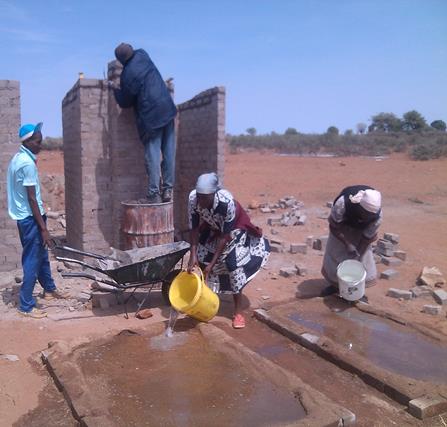Investigating the factors affecting Community-Led Total Sanitation in Liberia and Sierra Leone
19/07/2016

This summer, I will be going home to Africa to help improve the lives of those living in Liberia and Sierra Leone.
As a native Zimbabwean and the recipient of a Commonwealth Scholarship at Cranfield, it’s great that my MSc in Community Water and Sanitation includes the offer of an overseas placement. I’m delighted to have been given the opportunity to visit another part of Africa and I’m grateful to the University for arranging this chance to develop and learn with WaterAid (an international charity that transforms lives by improving access to safe water, hygiene and sanitation).
Community-Led Total Sanitation (CLTS) is an innovative approach for mobilising communities to completely eliminate open defecation, facilitate communities to conduct their own appraisal and analysis of open defecation, and take their own action to become open defecation free.
The approach was recommended by UNICEF as a sanitation coverage strategy towards achieving the United Nations’ Millennium Development Goals (MDGs), now replaced by the Sustainable Development Goals (SDGs) from 2016 onwards.
Since its introduction in Liberia and Sierra Leone in 2009, there has been widespread acceptability of the concept by communities and governments. This includes self-replication of the concept in communities, as more became open defecation free without being triggered by any agency.
However, following successful implementation of the CLTS approach, concerns have been raised about some communities reverting from the open defecation free status.
This has led me to investigate the factors affecting the sustainability of CLTS, focused on these two countries in West Africa. The primary aim is to find out why some CLTS programmes in Liberia and Sierra Leone succeed in realising sustainable open defecation free status, while others fail to do so.
I’m wanting to understand the ambition, implementation plans and associated performance targets of CLTS initiatives; identify and compare the challenges of CLTS roll-out in communities where open defecation free status was achieved and not achieved; identify features of CLTS implementation associated with non-open defecation free compliance; and to design a ‘roadmap’ to strengthen the sustainability of CLTS initiatives.
My study will be qualitative and ethnographic as sustainability of the CLTS approach is dependent on community behaviours, how they organise themselves and their response to external interventions. It will also take a comparative approach, as I seek to expose both inconsistencies between ideal and real CLTS implementation, and weaknesses in the link between implemented actions and impact, allowing a comparable evaluation of the determinants of relative success and failure.
In each of the two countries, two districts or counties will be purposely selected, based on the reports of relapse of CLTS and open defecation free achievement. Two communities will be selected from each district – one that achieved open defection free status and relapsed; and a non-open defecation free community.
My research will use document identification and retrieval; conduct in-depth interviews with the heads of government departments, community leaders, and other non-governmental organisations; take focus groups; and make home visits to observe. I will record all these communications and then transcribe them, taking note of key themes and statements, with this data hopefully providing clues to the various factors influencing CLTS sustainability.
I look forward to gaining some experience in social research at international level and understanding the basic principles of consultancy in WASH (Water, Sanitation and Hygiene)-related assignments. It is also an opportunity for me to know more about other cultures and learn new languages in the African coastal regions.
Ncomulwazi Khumalo, MSc in Community Water and Sanitation
Categories & Tags:
Leave a comment on this post:
You might also like…
Keren Tuv: My Cranfield experience studying Renewable Energy
Hello, my name is Keren, I am from London, UK, and I am studying Renewable Energy MSc. My journey to discovering Cranfield University began when I first decided to return to academia to pursue ...
3D Metal Manufacturing in space: A look into the future
David Rico Sierra, Research Fellow in Additive Manufacturing, was recently involved in an exciting project to manufacture parts using 3D printers in space. Here he reflects on his time working with Airbus in Toulouse… ...
A Legacy of Courage: From India to Britain, Three Generations Find Their Home
My story begins with my grandfather, who plucked up the courage to travel aboard at the age of 22 and start a new life in the UK. I don’t think he would have thought that ...
Cranfield to JLR: mastering mechatronics for a dream career
My name is Jerin Tom, and in 2023 I graduated from Cranfield with an MSc in Automotive Mechatronics. Originally from India, I've always been fascinated by the world of automobiles. Why Cranfield and the ...
Bringing the vision of advanced air mobility closer to reality
Experts at Cranfield University led by Professor Antonios Tsourdos, Head of the Autonomous and Cyber-Physical Systems Centre, are part of the Air Mobility Ecosystem Consortium (AMEC), which aims to demonstrate the commercial and operational ...
Using grey literature in your research: A short guide
As you research and write your thesis, you might come across, or be looking for, ‘grey literature’. This is quite simply material that is either unpublished, or published but not in a commercial form. Types ...






